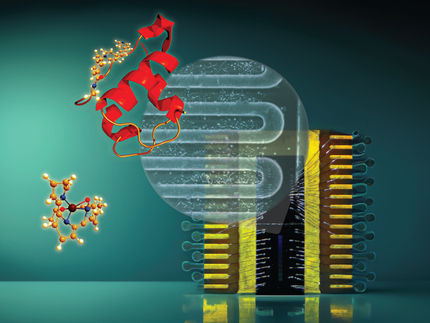2011 FEBS/EMBO Women in Science Award honours Carol V. Robinson
British chemist recognized as leader in mass spectrometry
The European Molecular Biology Organization (EMBO) and the Federation of European Biochemical Societies (FEBS) announce Carol V. Robinson, Professor of Chemistry at the University of Oxford, UK, as the winner of the 2011 FEBS/EMBO Women in Science Award. Professor Robinson has been recognized for her pioneering work in the development of mass spectrometry as a tool used for investigating the structure and dynamics of protein complexes.
The FEBS/EMBO Women in Science Award rewards the exceptional achievements of a female researcher in molecular biology over the previous five years. Winners of the award are role models who inspire future generations of women in science.
“Carol V. Robinson has pioneered, in an almost single-handed manner, the use of electrospray mass spectrometry for structural studies of large multimeric protein assemblies. She had the courage to do what experts regarded as not feasible and has succeeded in the face of strong skepticism,” stated her collaborator Wolfgang Baumeister from the Max Planck Institute of Biochemistry in Martinsried, Germany, in his nomination of Carol Robinson for the award.
Robinson’s research has opened up a new area of mass spectrometry. Her group was one of the first to use electrospray mass spectrometry to study large protein complexes. In collaboration with Micromass UK, she designed an instrument specifically adapted for the detection of high-mass complexes. This instrument has since gone into production in Canada and the UK and has now been installed in many laboratories around the world. More recently, her research has focused on combining mass spectrometry with cryoelectron microscopy.
The 2011 winner is distinguished not only for her scientific contributions, but also for her support and mentoring of women pursuing careers in science. As a group leader, Carol understands the importance of a flexible workplace for the scientists in her lab who are parents.
Her own career path was marked by her early start as a laboratory technician for seven years before obtaining a PhD. She then took an eight-year break to raise her three children. She returned to the lab as a post doctoral researcher, built her research group, and became the first female professor of chemistry at Cambridge University in 2001. Three years later, she was made a Fellow of the Royal Society and was awarded the Royal Society’s Rosalind Franklin Award that promotes women in science, technology, engineering and mathematics.
The 2011 FEBS/EMBO Women in Science Award of 10,000 euros will be presented to Carol V. Robinson on 28 June at the 36th FEBS Congress in Torino, Italy, where she will present a special lecture.
Other news from the department science
Most read news
More news from our other portals
See the theme worlds for related content
Topic World Mass Spectrometry
Mass spectrometry enables us to detect and identify molecules and reveal their structure. Whether in chemistry, biochemistry or forensics - mass spectrometry opens up unexpected insights into the composition of our world. Immerse yourself in the fascinating world of mass spectrometry!

Topic World Mass Spectrometry
Mass spectrometry enables us to detect and identify molecules and reveal their structure. Whether in chemistry, biochemistry or forensics - mass spectrometry opens up unexpected insights into the composition of our world. Immerse yourself in the fascinating world of mass spectrometry!




















































